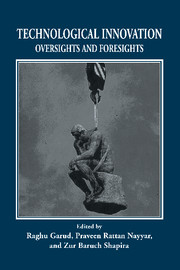Book contents
- Frontmatter
- Contents
- Contributors
- Foreword
- Preface
- Section I Introduction
- Section II Learning to flip coins
- 2 On flipping coins and making technology choices: Luck as an explanation of technological foresight and oversight
- 3 Technological choices and the inevitability of errors
- 4 Rational entrepreneurs or optimistic martyrs? Some considerations on technological regimes, corporate entries, and the evolutionary role of decision biases
- Section III Tailoring fits
- Section IV Remembering to forget
- Section V (S)Top management and culture
- Section VI Clearing the fog
- Author Index
- Subject Index
2 - On flipping coins and making technology choices: Luck as an explanation of technological foresight and oversight
Published online by Cambridge University Press: 07 October 2011
- Frontmatter
- Contents
- Contributors
- Foreword
- Preface
- Section I Introduction
- Section II Learning to flip coins
- 2 On flipping coins and making technology choices: Luck as an explanation of technological foresight and oversight
- 3 Technological choices and the inevitability of errors
- 4 Rational entrepreneurs or optimistic martyrs? Some considerations on technological regimes, corporate entries, and the evolutionary role of decision biases
- Section III Tailoring fits
- Section IV Remembering to forget
- Section V (S)Top management and culture
- Section VI Clearing the fog
- Author Index
- Subject Index
Summary
The ad was unusually bold for the Wall Street Journal. The headline read, “A Chance to Earn Big Bucks.” The fine print went on to describe a contest to be held the next week at a large auditorium in New York City. The contest was going to be simple one, with simple rules. Upon arrival, each contestant would be given a quarter. In the first round of the contest, all contestants would flip their coins. Contestants who flipped a “head” would continue in the contest; those who flipped a “tail” would be eliminated. The contest would continue through a series of coin flipping rounds, until there was only one person left. This person would then collect all the quarters from all the contestants. To ensure that there would be a single winner, if all those in the contest flipped “tails” in a particular round, they would all be allowed to continue in the contest. The ad described only one requirement for those seeking to enter this contest: they must be either highly educated, or have a great deal of experience, in the management of technology.
Of course, this ad created a great stir among the business and technological elite in the nation. The Internet was full of people discussing the contest, arguing about whether or not they should attend, and debating the relative merits of alternative coin-flipping methodologies. As the day of the contest approached, it became clear that the number of people who wanted to be in the contest was larger than what could be safely accommodated in an auditorium, and the contest organizers moved the contest from the auditorium to the Meadowlands stadium, in New Jersey.
- Type
- Chapter
- Information
- Technological InnovationOversights and Foresights, pp. 13 - 19Publisher: Cambridge University PressPrint publication year: 1997
- 25
- Cited by



